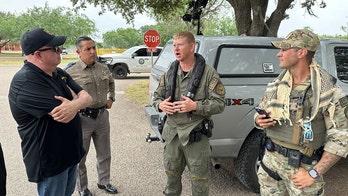Should gun laws in America be changed?
Dee Dee Benkie & Brian Benjamin discuss if possession of assault weapons should be against the law
The call for federal lawmakers to tighten gun laws has intensified following the mass shooting in Colorado, with New Jersey Democratic Sen. Frank R. Lautenberg urging Congress on Saturday to swiftly address a ban on certain weapons.
“Let's stop wasting time and start saving lives,” Lautenberg, D-N.J. said on his Twitter account. “Congress must prioritize a ban on high-capacity gun magazines.”
At least one other lawmaker has already called on President Obama and GOP challenger Mitt Romney to address the issue.
"Soothing words are nice," New York Mayor Michael Bloomberg said in a radio interview, "but maybe it's time that the two people who want to be president of the United States stand up and tell us what they are going to do about it, because this is obviously a problem across the country."
Lautenberg was also among the first on Capitol Hill to comment on the shooting massacre early Friday at a suburban Colorado movie theatre that left 12 people dead and dozens wounded. The alleged shooter, James Holmes, was armed with an AR-15 assault rifle and three other weapons.
“The shooting in Aurora is a horrific act of violence, and our thoughts go out to the innocent victims and their families,” he said Friday. “Our hearts are filled with sadness for the 12 people killed and the dozens wounded in this senseless act. We have to face the reality that these types of tragedies will continue to occur unless we do something about our nation’s lax gun laws.”
A Lautenberg aide has told the Huffington Post, “If reports are correct and a high-capacity gun magazine was used to commit these awful murders, Senator Lautenberg will absolutely renew his effort to limit the availability of this dangerous firearm attachment."
Last year, Lautenberg introduced legislation to ban high-capacity ammunition magazines. He also has authored other gun-related bills including one that would close so-called loopholes on background checks for buyers at gun shows.
Once, every highly publicized outbreak of gun violence produced strong calls from Democrats and a few Republicans for tougher controls on firearms.
Now those pleas are muted, a political paradox that's grown more pronounced in an era scarred by Columbine, Virginia Tech, the wounding of a congresswoman and now the shooting in a suburban movie theater where carnage is expected on-screen only.
"We don't want sympathy. We want action," Dan Gross, president of the Brady campaign said Friday as Obama and Romney mourned the dead.
Ed Rendell, the former Democratic governor of Pennsylvania, was more emphatic than many in the early hours after the shooting. "Everyone is scared of the NRA," he said on MSNBC. "Number one, there are some things worth losing for in politics and to be able to prevent carnage like this is worth losing for."
Yet it's been more than a decade since gun control advocates had a realistic hope of getting the type of legislation they seek, despite predictions that each shocking outburst of violence would lead to action.
In 1994, Congress approved a 10-year ban on 19 types of military-style assault weapons. Some Democrats quickly came to believe the legislation contributed to their loss of the House a few months later.
Five years later, Vice President Al Gore cast a tie-breaking Senate vote on legislation to restrict sales at gun shows.
The two events turned out to be the high-water mark of recent Democratic drives to enact federal legislation aimed at reducing gun violence, and some Republicans said they could see the shift coming.
"The news media in its lather to distort this whole issue may be wrong in their estimation that this will help Al Gore," then-Senate Majority Leader Trent Lott, R-Miss., said in an Associated Press interview a few weeks after the tie-breaking vote. "As a matter of fact, it may already have hurt him, and it may hurt him a lot more."
By 2004, when the assault weapon ban lapsed, congressional Democrats made no serious attempt to pass an extension. President George W. Bush was content to let it fade into history.
Public sentiment had swung.
According to a Gallup poll in 1990, 78 percent of those surveyed said laws covering the sale of firearms should be stricter, while 19 percent said they should remain the same or be loosened.
By the fall of 2004 support for tougher laws had dropped to 54 percent. In last year's sounding, 43 percent said they should be stricter, and 55 percent said they should stay the same or be made more lenient.
In terms of electoral politics, Harry Wilson, a Roanoke College professor and author of a book on gun politics, said violent crime has been declining in recent years and, "It becomes increasingly difficult to make the argument that we need stricter gun control laws."
Additionally, he said in some regions, gun control "can be a winning issue for Democrats. But nationally, it's a loser ... and they have figured that out." Attempts to emphasize the issue will "really motivate the opposition. And in a political campaign, nobody wants to do that," he said.
At its core, Wilson said, the issue divides rural voters from urban voters.
Often, that means Republicans on one side, Democrats on the other. But not always.
In the current election cycle, the National Rifle Association has made 88 percent of its political donations to Republicans, and 12 percent to Democrats, according to OpenSecrets.org. The disparity obscures that the organization consistently supports some Democrats, a strategy that allows it to retain influence in both parties.
It also reported spending $2.9 million on lobbying last year.
Its clout was vividly on display in 2010 when majority Democrats in the House sidetracked legislation giving the District of Columbia a voting representative in the House of Representatives. Republicans had vowed to add an NRA-backed provision invalidating a city ban on handgun possession as the price for passage, and there was little doubt it had the votes to prevail.
Later in the year, the NRA objected to legislation to require groups airing political advertising to disclose donors. Fearing the fallout, enough rank and file Democrats demanded changes that the leadership had to revise the bill. A revised bill, granting the NRA and other large organizations an exemption, eventually passed.
Gross, head of the Brady Campaign, says Democrats have drawn the wrong lessons for years. "The cultural narrative exists because of the assessment of Al Gore's loss in 2000 and the mid-terms in 1994, and in both cases I think the gun issue was scapegoated," he said. "Those who didn't vote for Al Gore weren't going to vote for him anyway."
At the same time, Gross readily conceded the lingering hold of the issue.
"Look at Kerry when he felt he needed to dress up in hunting gear," he said, referring to the Democratic presidential candidate's well-photographed excursion into a duck blind in camouflage clothing in swing-state Ohio a few weeks before the 2004 election.
Four years later, Obama won the White House despite strong opposition from the NRA.
As a senator from Illinois and state lawmaker before that, he was a strong supporter of gun control.
Following last year's killing of six people and the wounding of Rep. Gabrielle Giffords in Tucson, Ariz., Obama called for steps to "keep those irresponsible, law-breaking few from getting their hands on a gun in the first place."
He advanced no legislative proposals then, and on Friday, spokesman Jay Carney said, "The president believes that we need to take common-sense measures that protect Second Amendment rights of Americans, while ensuring that those who should not have guns under existing law do not get them."
Obama isn't the only 2012 White House candidate to adjust his views on gun control.
In a losing Senate campaign in Massachusetts in 1994, Romney said, "I don't line up with the NRA." A decade later, as governor, he signed legislation making a state assault weapons ban permanent.
This year, bidding for support at the NRA convention, he said: "We need a president who will enforce current laws, not create new ones that only serve to burden lawful gun owners."
The Associated Press contributed to this report.





